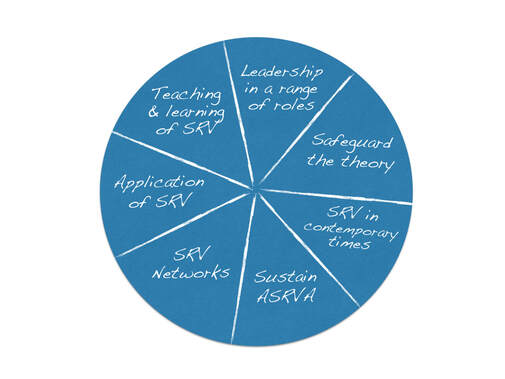WELCOME
Thank you for visiting the website of the Australian SRV Association (ASRVA). We hope the site will be helpful for all those who are interested in connecting with like-minded others about SRV, knowing the possibilities and issues in applying SRV, looking for training opportunities, and looking for ways of getting involved.
We welcome the opportunity for those interested in learning more about SRV and its application to get in touch with us to discuss the future of SRV in Australia and beyond. To get in touch please visit our contact page.
We welcome the opportunity for those interested in learning more about SRV and its application to get in touch with us to discuss the future of SRV in Australia and beyond. To get in touch please visit our contact page.
About Australian Social Role Valorisation Association
Previously known as the Australian SRV Group then the Australian and New Zealand SRV Group (ANZSG), the 2015 re-formation of the SRV safeguarding group in Australia adopted the name ‘Australian Social Role Valorisation Association (ASRVA).
The higher order vision of ANZSG has been adopted by ASRVA: that people with a devalued status are enabled to be perceived positively and have good lives.
The higher order vision of ANZSG has been adopted by ASRVA: that people with a devalued status are enabled to be perceived positively and have good lives.
Vision
For ASRVA, what is key to the future of SRV is a sense of social justice, leadership development, and working for change with individuals, services, systems and citizens. It is hoped that SRV is understood widely to have strategic significance in a range of contexts.
It is also imagined that the ‘community’ of those who see value in SRV benefit from being part of a collective with shared values and ideas, where there are mentors and supporters of SRV, opportunities for individuals to develop, leadership in a range of roles, lots of SRV conversations, local action, and connections between and among local efforts. We hope that you will join with us in creating this future.
It is also imagined that the ‘community’ of those who see value in SRV benefit from being part of a collective with shared values and ideas, where there are mentors and supporters of SRV, opportunities for individuals to develop, leadership in a range of roles, lots of SRV conversations, local action, and connections between and among local efforts. We hope that you will join with us in creating this future.
PURVIEW and GOAL AREAS
ASRVA’s scope of responsibility is to foster, safeguard, and develop the theory and application of SRV, and to accredit teachers of SRV. The goal areas are named in the following figure.
ABOUT SRV & A DEFINITION
The theory of Social Role Valorisation (SRV) is a combination of important ideas drawn from the social sciences. The themes within SRV are helpful in responding to the needs of individuals and groups with a devalued status, so that they might have access to the good things of life and in order to influence how they are perceived.
Though SRV was developed as a theory by Dr Wolf Wolfensberger in the early 1980s and based on his highly relevant work in the preceding decades, SRV still has many practical implications and so is used as a practice framework as well as a guiding theory. It is also helpful in both the design and in the analysis of support arrangements.
The theory rests on a deep understanding of social devaluation and its impacts, a societal dynamic that explains why it is that certain groups in our society are likely to experience significant marginalisation and prejudice.
One definition of SRV is
‘the enablement, establishment, enhancement, maintenance, and/or defense of valued social roles for people, particularly for people at value-risk, by using, as much as possible, culturally valued means.’
Thomas, S 2017, Social Role Valorization Theory: Wolf Wolfensberger, updated April 2017, viewed 16 July, <https://www.wolfwolfensberger.com/life-s-work/social-role-valorisation>.
ASRVA is indebted to Dr Wolfensberger for his extensive writings and teachings about SRV and related topics, as well as to his long-term colleague Susan Thomas, Training Coordinator at the Training Institute for Human Service Planning, Leadership, andChange Agentry, Syracuse University.
Useful articles
Joe Osburn: An Overview of Social Role Valorization Theory
Jane Sherwin: Journeying into the Everyday: Fostering the Application of Social Role Valorisation
Jane Sherwin: Acceptance and Belonging helpfulness of being in valued roles
Though SRV was developed as a theory by Dr Wolf Wolfensberger in the early 1980s and based on his highly relevant work in the preceding decades, SRV still has many practical implications and so is used as a practice framework as well as a guiding theory. It is also helpful in both the design and in the analysis of support arrangements.
The theory rests on a deep understanding of social devaluation and its impacts, a societal dynamic that explains why it is that certain groups in our society are likely to experience significant marginalisation and prejudice.
One definition of SRV is
‘the enablement, establishment, enhancement, maintenance, and/or defense of valued social roles for people, particularly for people at value-risk, by using, as much as possible, culturally valued means.’
Thomas, S 2017, Social Role Valorization Theory: Wolf Wolfensberger, updated April 2017, viewed 16 July, <https://www.wolfwolfensberger.com/life-s-work/social-role-valorisation>.
ASRVA is indebted to Dr Wolfensberger for his extensive writings and teachings about SRV and related topics, as well as to his long-term colleague Susan Thomas, Training Coordinator at the Training Institute for Human Service Planning, Leadership, andChange Agentry, Syracuse University.
Useful articles
Joe Osburn: An Overview of Social Role Valorization Theory
Jane Sherwin: Journeying into the Everyday: Fostering the Application of Social Role Valorisation
Jane Sherwin: Acceptance and Belonging helpfulness of being in valued roles
